I’M IN SEMI-RETIREMENT AND THIS BLOG IS WINDING DOWN. I INTEND CALLING IT A DAY IN THE NEXT FEW MONTHS. POSTINGS WILL PROBABLY BE LESS FREQUENT AND I WILL NOT UNDERTAKE ANY MAJOR NEW INVESTIGATIONS. DIOLCH YN FAWR.
♦
![]() This post is a ‘filler’ until we return to that cornucopia of dissembling, skulduggery, and now whimpering, put-upon Marxists – YesCymru! Possibly with a post at the weekend.
This post is a ‘filler’ until we return to that cornucopia of dissembling, skulduggery, and now whimpering, put-upon Marxists – YesCymru! Possibly with a post at the weekend.
∼
Most of you will I’m sure have heard that the old slate quarries and mines of Gwynedd have been awarded UNESCO World Heritage status.
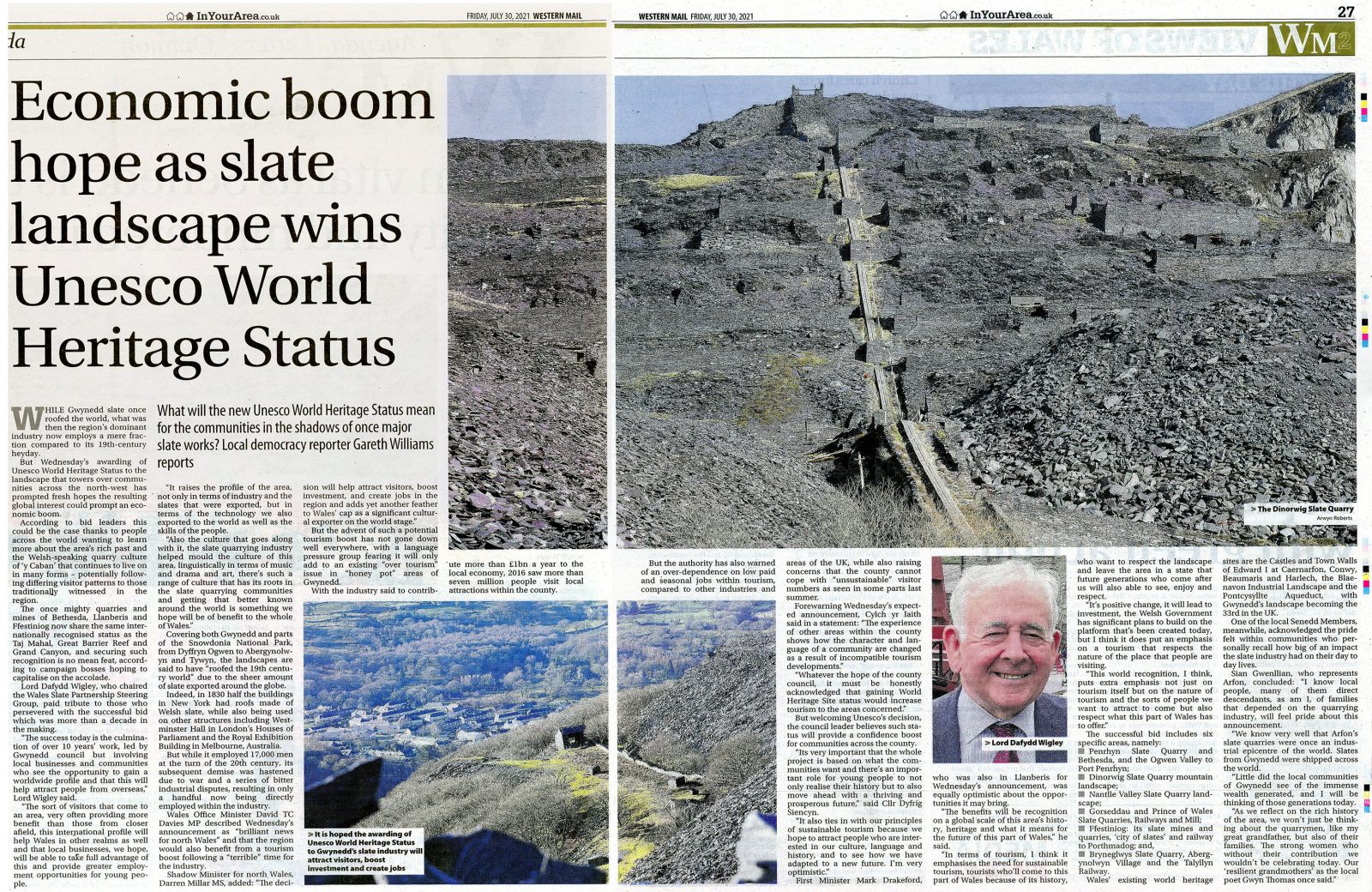
(Here’s the above article in pdf format.)
Even though I live very close to a former slate quarry, Bryneglwys, in a village largely built in the 19th century to house the quarrymen and their families, and even though I’ve been (loosely) involved with the local preparations of the bid to UNESCO, like many others I’m wondering how exactly my community will benefit.
Let me explain.
I first learnt of the UNESCO bid in the autumn of 2019. There was a meeting or a presentation in our Ganolfan organised by Gwynedd county council. So, ever the inquisitive, I rolled up to see what it was all about.
There were a few guys there who seemed to be running the show, and I assumed they worked for Cyngor Gwynedd; but no, they were from the Talyllyn Railway (TR). Which I found to be rather surprising, and disappointing.
The people of Abergynolwyn, many of them the children, grandchildren or great-grandchildren of quarrymen, knew little or nothing about the UNESCO bid, and yet the Talyllyn Railway not only knew about it but also seemed to have commandeered its local element.
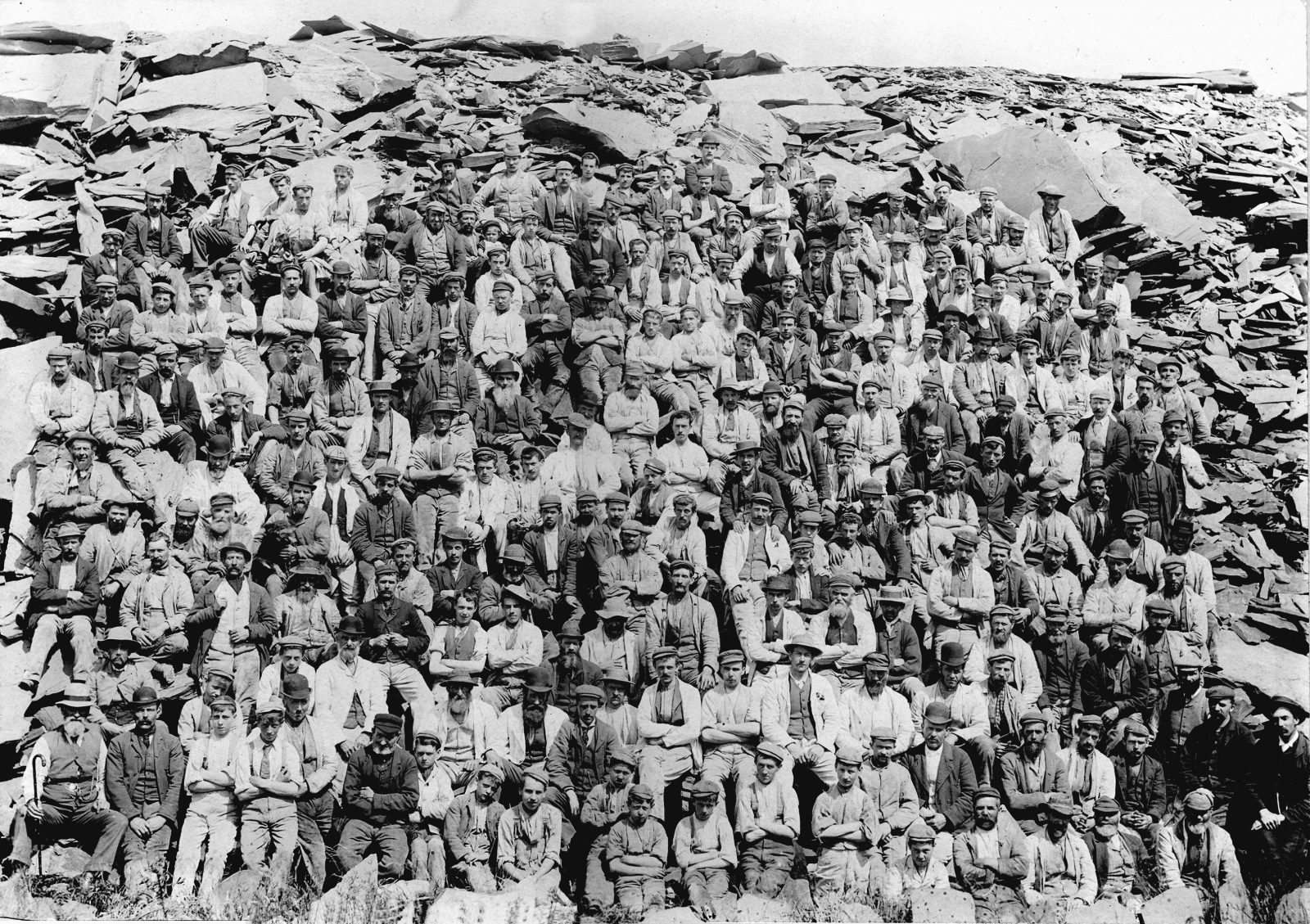
Worse, projects in Tywyn, having only the most tenuous connection with the slate industry, also had bids in for their slices of the cake.
Another at the meeting was the owner of ‘King Arthur’s Labyrinth‘ in Corris, located in the old tunnels dug and blasted to extract slate in the next valley. This place is to Welsh history what Boris Johnson is to statesmanship.
For those unfamiliar with the area, Corris is the most southerly of the Gwynedd slate communities and on the same seam as Bryneglwys.
But back to the Talyllyn Railway.
∼
Some twenty years ago, I was raising the money to build our new Ganolfan. Not an easy job, and at times dis-spiriting. To fill out a 60-page application form, make sure that all the attachments are in place, and then get a curt response that says, basically, ‘Hard luck, pal’, is very frustrating.
One example was an application I made to the Aggregates Levy Sustainability Fund (ALSF). I think the figure I applied for was £200,000.
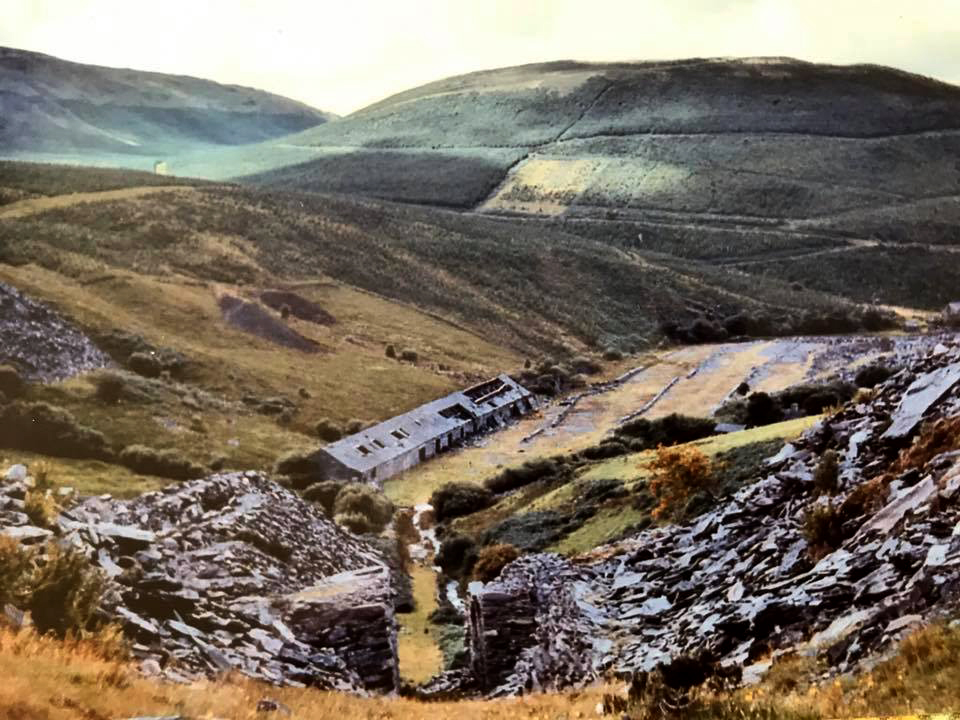
Anyway, the point was that this funding was for communities within 5 miles of a quarry or aggregate workings. So, I filled up the form, sent it off, and a representative of the ALSF came to discuss it. ‘No problem’, says he, ‘you meet all the criteria . . . but of course it will have to go before the panel’.
The panel, or rather the two who swung the decision – both involved in tourism – decided that the grant should go to the Talyllyn Railway. To be spent on its Wharf Station in Tywyn, over 7 miles from Bryneglwys quarry.
The justification given was that the TR had a closer link than the village with the quarry. And the track itself came within the required 5 miles!
Now, I don’t deny that the railway was built to carry slate to the coast and the main line, but it is now a commercial enterprise, a tourist railway, run almost exclusively by ‘enthusiasts’ from over the border.
Whereas the village of Abergynolwyn, as I’ve said, was built to serve the quarry, and is still home to descendants of the quarry workers. (My wife among them.)
∼
Another reason I’m less than optimistic relates to the ownership of Bryneglwys quarry.
For the Land Registry title document says that in 1980 Bryneglwys passed from Hugh Pugh Roberts to the Secretary of State for Wales. Then, in 2006, it transferred to the National Assembly for Wales.
The quarry is now in the stewardship of our old friends at Natural Resources Wales (NRW). Where they seem to believe that it’s near Machynlleth.
Which I suppose it is . . . if you’re a particularly energetic crow; or if you fancy climbing a few miles up to the ridge and then, after getting your breath back, negotiating a few more miles on t’other side as you descend into the Dyfi valley. (But you do get a nice view of Cader Idris and you can see down to the coast.)
The reason the mention of NRW saw my spirits sink is because of that agency’s record. In just the previous post on this blog we read about Natural Resources Wales offering up publicly-owned Welsh land to foreign investors who are thinking of plonking on it the tallest wind turbines we’ve yet seen.
Put together the tourism element and the involvement of Natural Resources Wales and you should understand why I’m not optimistic that locals will see many benefits from the UNESCO recognition.
Added to which is a real danger that the former slate communities will see increased numbers of tourists. With all the attendant problems. This is what Cylch yr Iaith fears. And they aren’t the only ones.
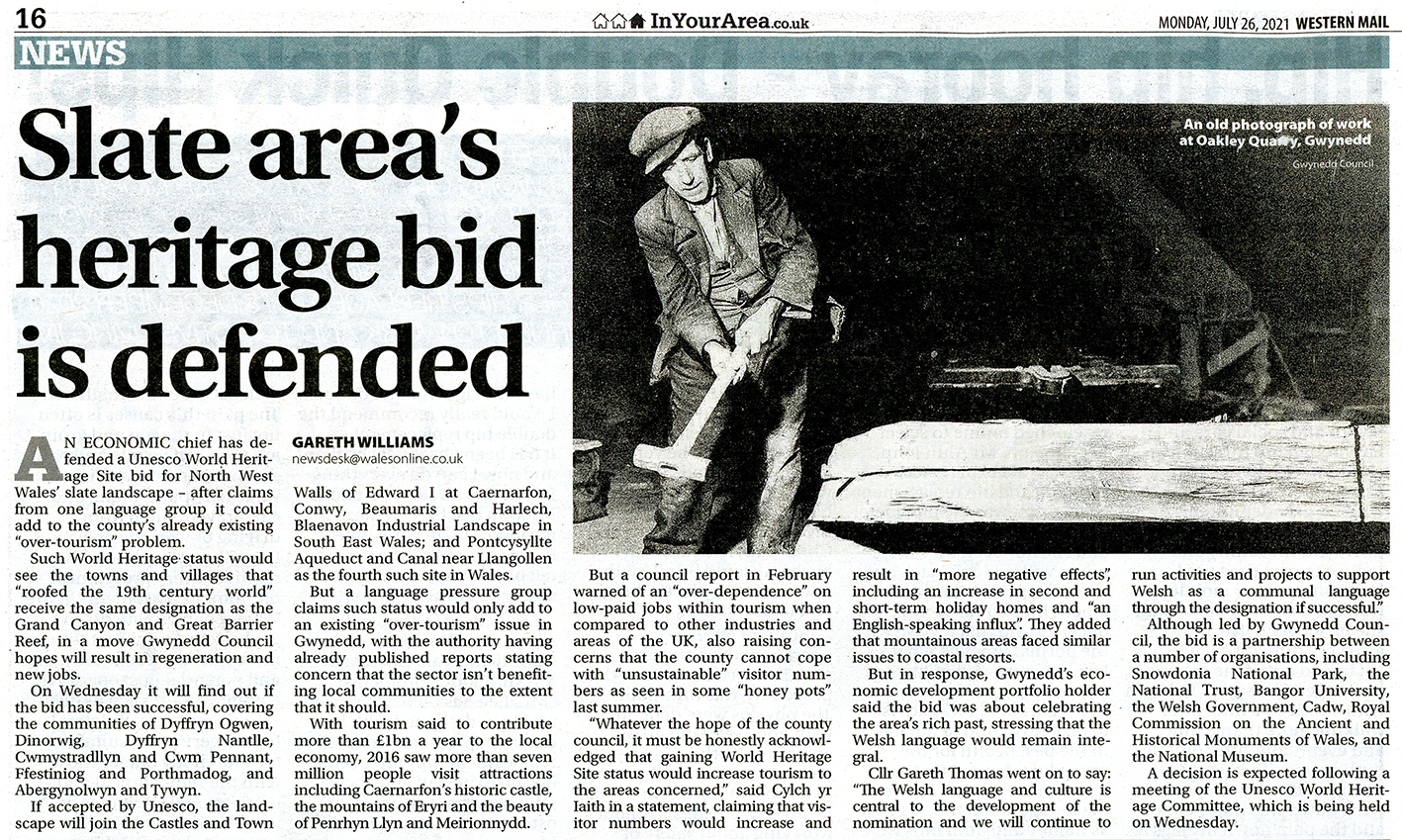
Which brings us to the fundamental conundrum.
Gwynedd council led the UNESCO bid, and champagne corks have been popping in Caernarfon since the decision was announced. And yet . . . the council has publicly conceded that certain parts of the county suffer unsustainable numbers of tourists.
Yet powerful lobbies will seek to exploit the UNESCO recognition to attract more tourists in order to make more money. More tourists means more traffic, more rubbish, more people looking to buy property, more pressure on Welsh-speaking communities.
To complicate matters, Bryneglwys quarry, unlike the larger sites at Blaenau Ffestiniog and Bethesda, is inside the Snowdonia National Park. So there’ll be no zip wires or underground trampolines.
But that aside, the overarching question remains . . .
How does Gwynedd square this circle of capitalising on UNESCO recognition without encouraging unsustainable and damaging levels of tourism?
∼
A further issue I have with this project is the way it has portrayed the relationship between Wales and England.
Here’s what our Secretary of State had to say about the announcement. ‘Fantastic news for the UK’, and he’s right. For we can guarantee that most of the beneficiaries will come from over the border.
It might also encourage more English people to ‘staycation’ in Wales thereby keeping their money in the UK. Which is a major reason why Wales suffers saturation tourism.
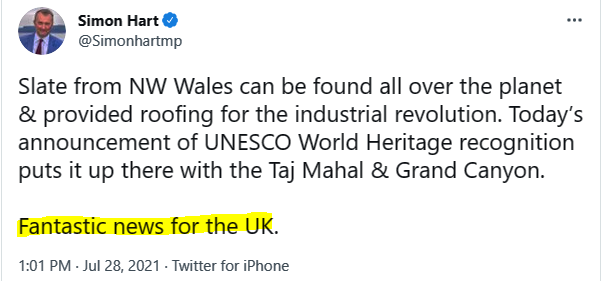
But it’s not just Simon Hart who’s guilty of misrepresenting the relationship. About a year or so ago the council commissioned a series of films, one for each of the quarries involved in the UNESCO bid.
The film for Bryneglwys focused almost entirely on the tenure of the McConnel brothers of Manchester, stressing that without English money there would have been nothing here. There was little mention of the men who worked – and died – at the quarry, their families, and the lives of the people of Abergynolwyn.
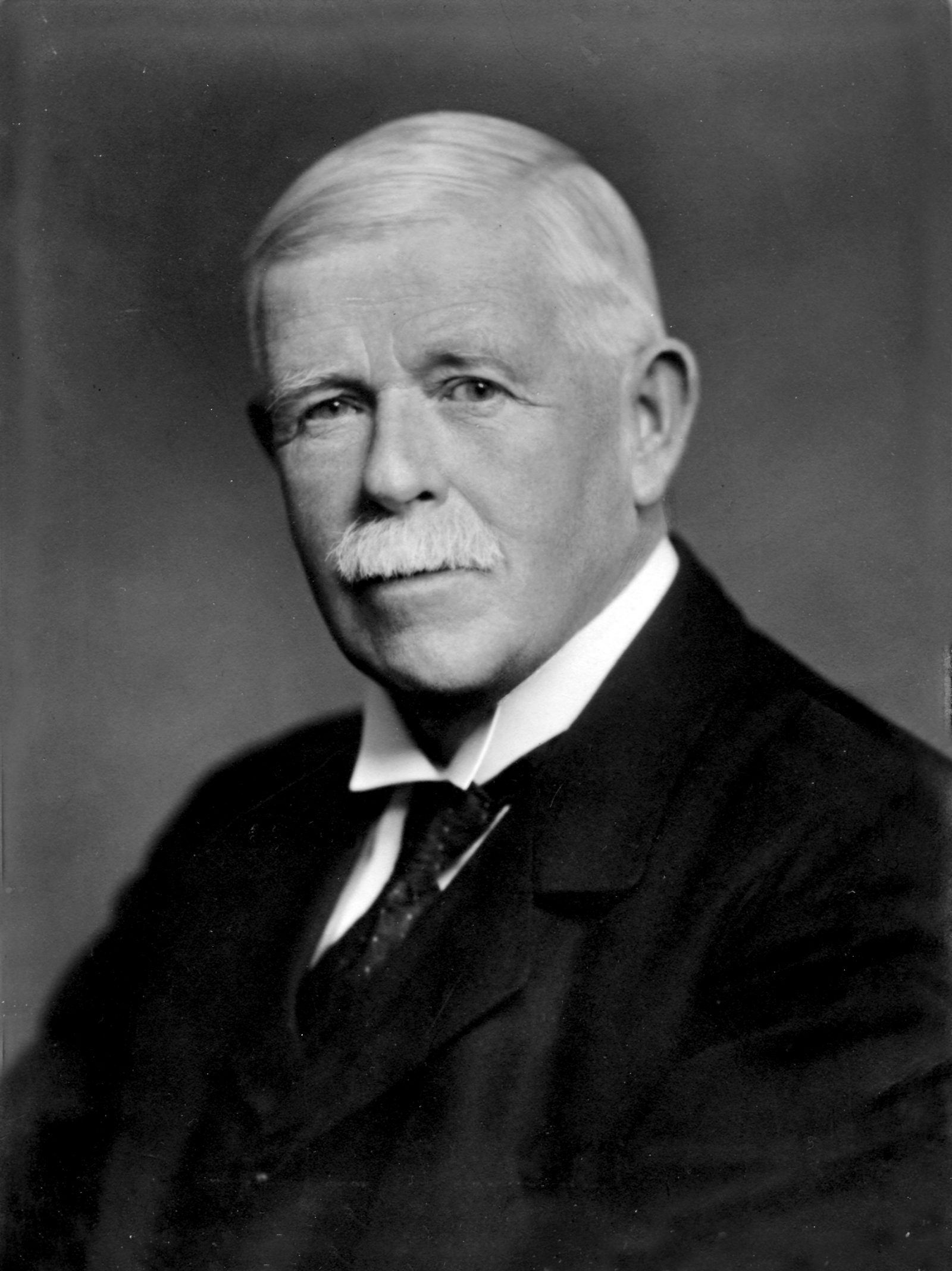
The truth is that slate was extracted in the 1820s, possibly earlier, by local men prepared to invest a bit of money and hard work. The McConnels arrived in 1864 because cotton was not reaching their Manchester mills from the Confederate states due to the war, and so they looked to diversify. In the third act, local MP, Sir Henry Haydn Jones took over in 1911, and kept the quarry open long after it ceased to be economically viable.
Certainly, the McConnels invested a lot of money, but they weren’t philanthropists, they came to make money, and if there hadn’t already been slate workings here they would never have heard of Bryneglwys. Yet the film commissioned by Cyngor Gwynedd wrote out the Welsh involvement entirely!
Another film, by Dr David Gwyn, put up on YouTube last week, is not a great improvement in its emphasis.
https://youtu.be/D0kRo7E3NzQ
Even this page from Llechi Cymru concentrates on the McConnels, with just a nod to those who went before, and no mention at all of Sir Henry Haydn Jones.
If I was one of those frightful nationalists I might view this ‘Can’t manage without England’ theme as fairly obviously political. Perhaps we’ll hear it again when the tourists start swamping the communities that have been blessed with UNESCO recognition.
And once again, we shall be expected to show gratitude for becoming strangers in our own communities, and our own country.
♦ end ♦

